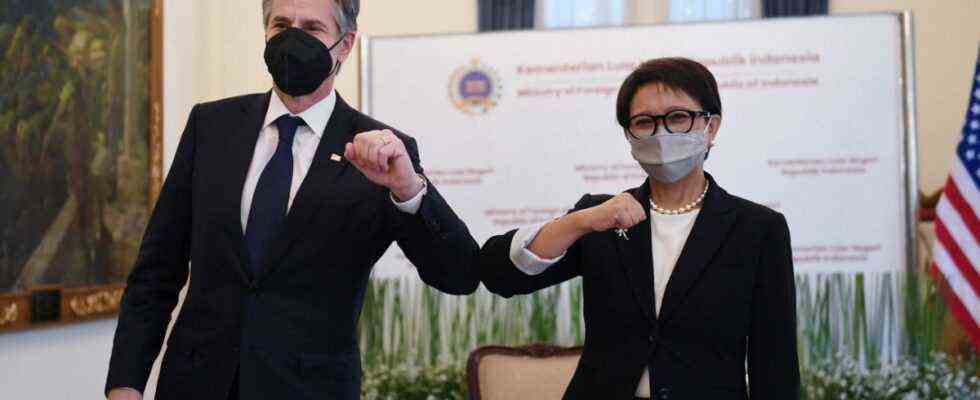So Jakarta. It’s not a coincidence. US Secretary of State Antony Blinken chose Indonesia to deliver his keynote address on strategy in the Indo-Pacific on Tuesday morning. It is the most populous country in Southeast Asia and one that maintains a noticeable distance from Beijing. That alone makes the state increasingly interesting for Washington.
Blinken wrapped his speech as a great promise to keep the Indo-Pacific region “free and open”, but of course he knows that he needs reliable partners in the region for this. In fact, the Philippines have been the region’s closest ally for a long time. But the erratic policies of President Rodrigo Duterte, who repeatedly rocked back and forth between Beijing and Washington in recent years, has increasingly irritated Washington. Reliability looks different.
Indonesia, on the other hand, is a country that insists on a very independent foreign policy. And so it would be an exaggeration to say that the country is already a close ally of the United States. The only thing that is certain is that Washington is very eager to find a closer relationship. Which is why Blinken made his first stop here on his trip through Southeast Asia before continuing on to Malaysia and Thailand.
The whole trip will revolve around the core of American interest: Washington is looking for a way to counter the expansive tendencies of the largest Asian power, China. In his speech on Tuesday morning, Blinken was very open about the concerns, as the Americans are observing in the region: “There is so much concern – from Northeast Asia to Southeast Asia, on the Mekong River and in the Pacific Islands – about Beijing’s aggressive actions” .
Blinken promises an “open Indo-Pacific”. Can he hold that
China claims “open sea”, by which he means the maritime disputes in Southeast Asia, China distorts the open markets by subsidizing its state-owned companies. He depicts a China that poses a threat to traffic in the South China Sea, an area through which goods worth three trillion dollars are transported every year.
“We are determined to ensure free navigation in the South China Sea”, promised Blinken, the USA would deepen its alliances in the region and also close “gaps in the infrastructure”; an indication that the USA not only want to be and will be present militarily, but that it would also like to become more involved economically in the future in order to maintain its traditional role as a Pacific power of order.
Blinken promised a status quo, “without coercion and intimidation” and on the “basis of rules”, in short: “a free and open Indo-Pacific”, although the audience in the region might accept such promises with some skepticism. The experience of recent years has already painted a different picture: China has consistently and regardless of its neighbors built artificial islands in the South China Sea, Taiwan is threatened, and it is militarizing maritime zones, regardless of rival territorial claims that smaller neighboring states are making, all of them first the Philippines and Vietnam. They are doing this on the basis of international law of the sea, which Beijing largely ignores.
Even Indonesia, which has no claims of its own in the South China Sea, has stimulated China with brisk fishing fleet maneuvers off the Natuna Islands, which could increase Jakarta’s interest in good connections with the USA. At the same time, however, the very rude Aukus deal about nuclear-powered submarines for Australia caused displeasure in Jakarta. Indonesia feels run over. The USA must therefore carefully approach its Indonesian partner. Above all, however, they must also offer something economically, which, by the way, applies to all of China’s neighboring countries. They want to know: What are the benefits of the US alliance? And they all want better access to the US market.
China was the main supplier of the vaccine
Despite Jakarta’s political distance from Beijing, the country’s elites are well aware of how much they depend on Chinese investments to advance their country. This was also shown by the pandemic in which Jakarta was almost exclusively dependent on Chinese vaccine deliveries. Since September, the Americans have given away almost eight million doses of Biontech Pfizer vaccine to Indonesia and, as Indonesian Foreign Minister Retno Marsudi put it, they are also showing a “strong commitment”. However, she also attached importance to the statement that there had to be “concrete cooperation” that would benefit both sides.
The Biden government should know very well how much the Americans have to catch up. Asia expert Michael Jonathan Green recently gave a sobering response when he observed that Washington’s economic policy in these countries has so far been akin to a “Thanksgiving dinner without a turkey”. A bit of cranberry sauce and filling, but nothing more. In other words, the US did not provide enough economic incentives to deepen ties. Quite different from the Chinese, who – to stay in the image of Green – distributed a lot of meat to keep the neighbors weighed or to appease them.
Washington must first repair the trust and connections that Donald Trump has shattered as President. At that time, he defiantly withdrew from the trans-Pacific economic pact TPP, which Obama had ambitiously initiated. The USA could not have provided Beijing with a nicer step forward; China used the vacuum to expand its own economic networks. The fact that Biden is now changing course again may be strategically overdue, but it is unlikely that he will be able to warm the US back to the TPP pact. The domestic political resistance in the USA to the trade pact is great.
America’s strategists are trying to forge special economic partnerships with individual states in the region, just as they are currently negotiating with Malaysia in the semiconductor industry.

